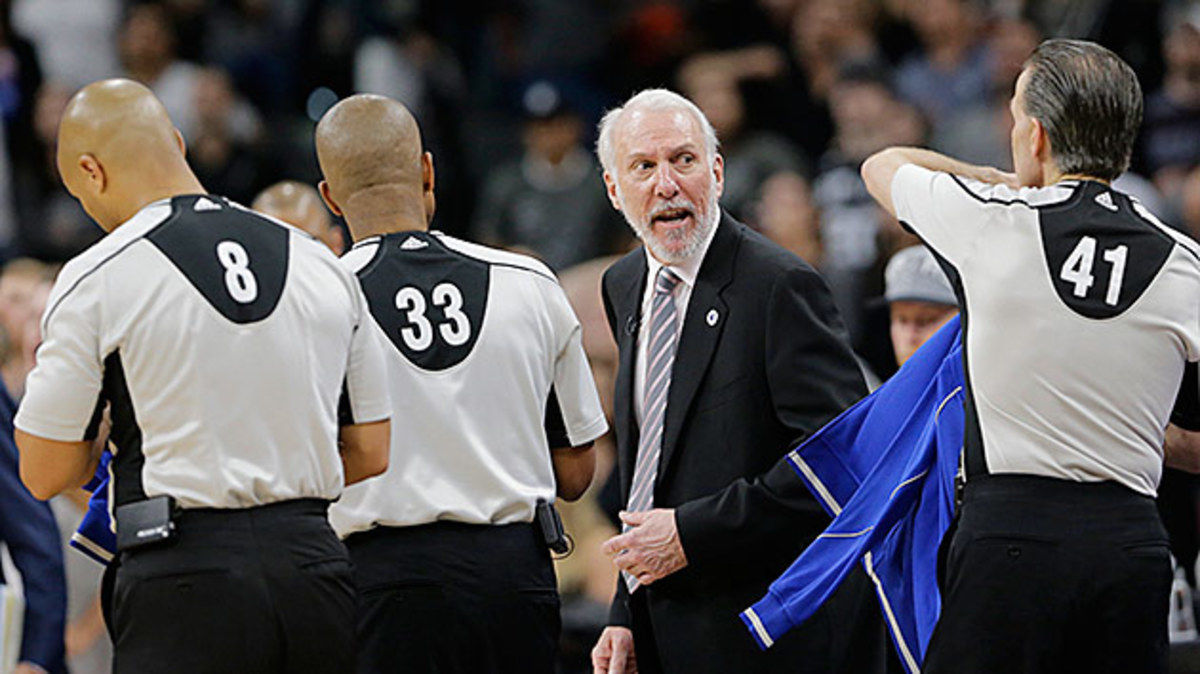Thunder beat Spurs in controversial Game 2 to revamp series

Get all of Rob Mahoney's columns as soon as they’re published. Download the new Sports Illustrated app (iOS or Android) and personalize your experience by following your favorite teams and SI writers.
SAN ANTONIO — If this year’s NBA playoffs have left some fans wanting, the Thunder, Spurs and a crew of officials did everything in their power to supply dramatic reparations on Monday night in Game 2 of the Western Conference semifinals. An entire game of competitive basketball was swallowed up by a single possession: With 13.5 seconds remaining and the Thunder leading by a single point, Dion Waiters triggered one of the strangest inbound possessions in playoff history.
Players on both sides were held and pushed all over the floor. Waiters, who was inbounding for Oklahoma City, elbowed Manu Ginobili (whose foot appeared to illegally crossed the sideline) before launching his pass in the air. A jump ball between Danny Green and Kevin Durant ended with a Thunder turnover and Durant on the floor. Green came away with the ball in the mad scramble, after which the Spurs futzed their way through a desperate possession. A three-on-one break—the best-case scenario in this kind of late-game chaos—produced no quality attempt. Steven Adams ultimately contested a Patty Mills three-pointer, the final shot of the game, and was then held by fans sitting courtside on the follow-through. LaMarcus Aldridge pulled in the rebound and then was pulled down by the jersey, sending the ball skittering around the ankles of four players. The play ended not with a whistle, but with the game’s final buzzer. Oklahoma City had won, 98–97.
Refs admit missed foul call by Waiters on Ginobili on final inbounds
The crowd at the AT&T Center booed and jeered for what seemed a solid minute. All of the rage and relief pent up in those final 13.5 seconds swirled around Spurs head coach Gregg Popovich, who could only smile and nod when asked by a frenzied David West if he had seen the bizarre elbow that launched a well-played game into unbelievable mayhem. The officials themselves were lost in the moment.
“It’s a play we’ve never seen before, ever,” said Ken Mauer, the lead official in the game. “We should have had an offensive foul on the play.”

That kind of unprecedented controversy seemed to drown out the fact that San Antonio got exactly the kind of opportunity it would have wanted out of the play, which only mattered at all because OKC put together a significantly more competitive performance than in Game 1. This was a different Thunder team, down to who played and when.
“We did a lot of different things tonight,” Thunder head coach Billy Donovan said. Among them: The move to completely relieve Durant of the assignment to guard Kawhi Leonard (which was handled instead by Waiters and Andre Roberson), the removal of Nick Collison and Kyle Singler from the rotation, the insertion of sharpshooter Anthony Morrow, the return of Thunder small-ball, the surprise appearance of jumbo lineups featuring Adams and Enes Kanter together and the eventual dismissal of in-over-his-head rookie Cameron Payne as the team’s backup point guard. Some of these changes helped. Others didn’t. In all they offered insight into circumstances the Thunder found themselves in after losing Game 1 by a jarring 32 points.
#http://www.120sports.com/video/v175814678/thunder-even-the-series
“The one thing with the roster is I think you have to experiment and explore different things at different times,” Donovan said.
The biggest changes in Oklahoma City’s play, however, were matters of disposition. Thunder defenders were handsy from the very first possession of the game. Adams attempted to keep a hold on Tim Duncan only to have his grip brushed away. Roberson did the same to Leonard on the perimeter, showing up front that offensive momentum would not come so easily. “First things first: We just wanted to make [Leonard] feel us,” Roberson said. The Thunder showed a spirited attention to each individual action. Ballhandlers had little space to operate. Cutters were bumped off their track. Screens were hurried into suboptimal angles and passes out of pressure were made difficult.
Despite uneven performance, Cavaliers fend off Hawks in Game 1
Challenging the release is only the last relevant part of defending a shot attempt. The Thunder made it a point to close out but didn’t skimp on all that came before, a marked improvement from the hapless chain reactions that yielded open look after open look in Game 1. Playing actual, professional-grade defense then relieved the Thunder from the grind of working against the Spurs’ own set defense on an every-play basis. Fast breaks off misses gave Russell Westbrook and OKC’s athletes new life, not to mention the means to make runs and build leads.
A similar transitional element played back into the Thunder defense. That Westbrook was able to hit jumpers over bigger defenders, that Durant’s shot was smooth and effective and that the Thunder role players hit their spot-up looks to sufficiency allowed OKC to actually regroup and apply pressure. San Antonio worked its way back from those off-balance possessions through alternating stretches of fluid team basketball and power-posting Aldridge, who had a game-high 41 points on 15-of-21 shooting, against Serge Ibaka. The arc of the game was a thrill. Every make felt monumental, as every missed opportunity must now in retrospect for the Spurs.
• GOLLIVER: Green stakes his claim as NBA’s best all-around player
What began in a blowout is now officially a series. Oklahoma City became the second team all season to beat San Antonio on its home floor just days after that initial, embarrassing effort. The difference, according to one Thunder player, was exceedingly simple.
“We came out and actually tried,” Adams said. “That’s pretty much it. We actually tried this time.”
For those with a vested interest in the Thunder’s results, should that sentiment be more heartening or disheartening?
